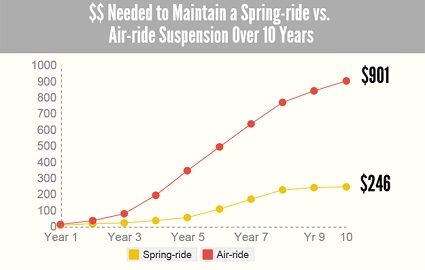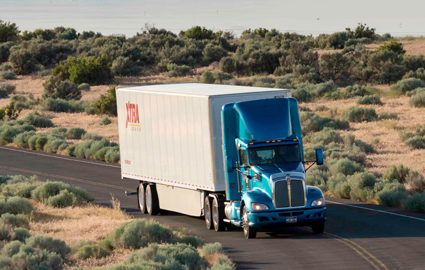
Comparing Maintenance and Costs of Trailer Suspensions
You might be surprised by the difference in what it costs to maintain spring-ride and air-ride suspensions.
On average, the productive life of a new trailer, regardless of suspension, is about 15 years when it’s maintained properly.
A trailer with air-ride suspension not only costs more up-front, but also the maintenance costs for that suspension begin to climb sharply when your trailer turns three years old. (See the chart at left.) That leaves you with about 12 years of expensive maintenance.

Air-ride maintenance adds up.
Most wearable parts—such as shock absorbers, ride height control valves and air bags—have shorter warranty periods, only one to three years. Those items wear down over time so it won’t be long before you’re paying for them yourself.
Plus, the base air-ride suspension structure is only warranted for seven years. If you’re lucky, you won’t have to do any major maintenance on the structure for the next eight years of your trailer’s productive life. (Do you usually hit the jackpot when you buy a lottery ticket?)
In comparing maintenance and costs of trailer suspensions, our experience shows that a spring-ride suspension costs much less to maintain over the life of the trailer.
Spring-ride maintenance is minimal for the first six or seven years. Then, maintenance cost associated with bushings, frames and adjustable radius rods may increase for hard-working trailers that log lots of miles.
Several of our customers, some of the country’s largest carriers, report that maintenance costs for air-ride suspensions can be close to 10 times higher than for spring-ride.
Data from the XTRA Lease fleet shows that, over 10 years, it costs about:
- $900 to maintain an air-ride suspension
- $240 to maintain a spring-ride suspension
As for tire wear, there’s no evidence to prove spring-ride suspension has an adverse effect on tire life. Experts at Michelin Americas Truck Tires report that “while it is believed there is a difference in wear rates and wear patterns between mechanical and air-ride suspensions, we are not aware of any definitive studies isolating those differences.”1
Bottom line: It’s more expensive to maintain an air-ride than a spring-ride suspension. Keep those costs in mind when you’re considering trailer suspensions.
[1] “Tire Report: Suspensions & Tire Wear.” By Jim Park, Heavy Duty Trucking online. April 2011.
- Read our article Why Spring-ride?
- You might also like our white paper comparing spring-ride and air-ride suspensions.
- Check out Schneider’s white paper comparing spring-ride and air-ride suspensions.
- Schneider has some real-world test results you may like to see.
- A&M Carriers found no change in driver retention when they increased the # of spring-ride suspensions in their fleet.
- Frost and Sullivan put together a Strategic Analysis of North American Semi-Trailer Advanced Technology Markets in March 2013. Zip over to slides 13, 18 & 22.
- Check out our cool infographic comparing spring-ride and air-ride suspensions.
